| | Israel moves closer to its Gaza City offensive, Europe moves to cement US support for Ukraine, and a͏ ͏ ͏ ͏ ͏ ͏ |
| |  | Flagship |  |
| |
|
The World Today | 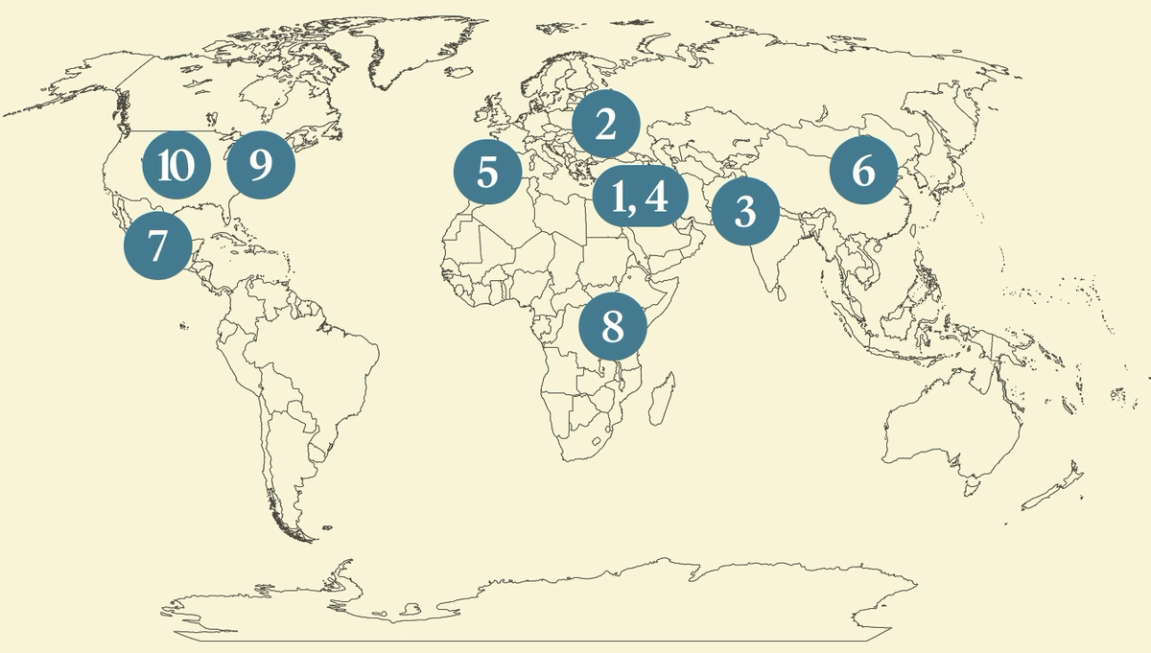 - Israel OKs Gaza City plan
- Europe plots Ukraine deal
- Floods hit South Asia
- Drought in Middle East
- Wildfires across Europe
- China’s brutal clean tech
- Mexico denies US deal
- US migrant crackdown
- Stablecoins’ global growth
- More physical bookstores
 The worrying expansion of a tropical disease, and a ‘thrilling, funny, and relatable’ novel translated from Chinese. |
|
Israel approves Gaza City offensive |
 Dawoud Abu Alkas/Reuters Dawoud Abu Alkas/ReutersIsrael’s defense minister approved a plan for an offensive on Gaza City, further undermining hopes for a truce there. Officials will also call up around 60,000 reservists in order to carry out the operation, which humanitarian agencies and experts fear will worsen what is already a burgeoning humanitarian catastrophe: The UN this week said levels of aid were far below what was required to “avert widespread starvation.” The intensifying of Israel’s military efforts in Gaza came as a 60-day ceasefire plan, which Hamas said it had accepted, looked in doubt: Israel said it would respond by Friday, but far-right members of the government have criticized the proposal, and Israel has demanded a full, rather than partial, release of hostages. |
|
Europe readies Ukraine plan |
 Ukrainian Presidential Press Service/Handout via Reuters Ukrainian Presidential Press Service/Handout via ReutersEuropean leaders sought to cement US support for Ukraine by pulling together a package of security guarantees ahead of proposed talks between Moscow and Kyiv. Details could be unveiled as early as this week, Bloomberg reported, in order to leverage an otherwise vague offer from the White House to back Ukraine: US President Donald Trump has opposed American boots on the ground, but suggested Washington may offer air support. The lack of clarity surrounding the plan mirrors a broader lack of consensus about the direction of efforts to end the war: Moscow wants to host the talks, the US is considering Budapest, and Europeans are pressing for Geneva, and all the while, Russia has kept attacking Ukraine. |
|
Floods devastate South Asia |
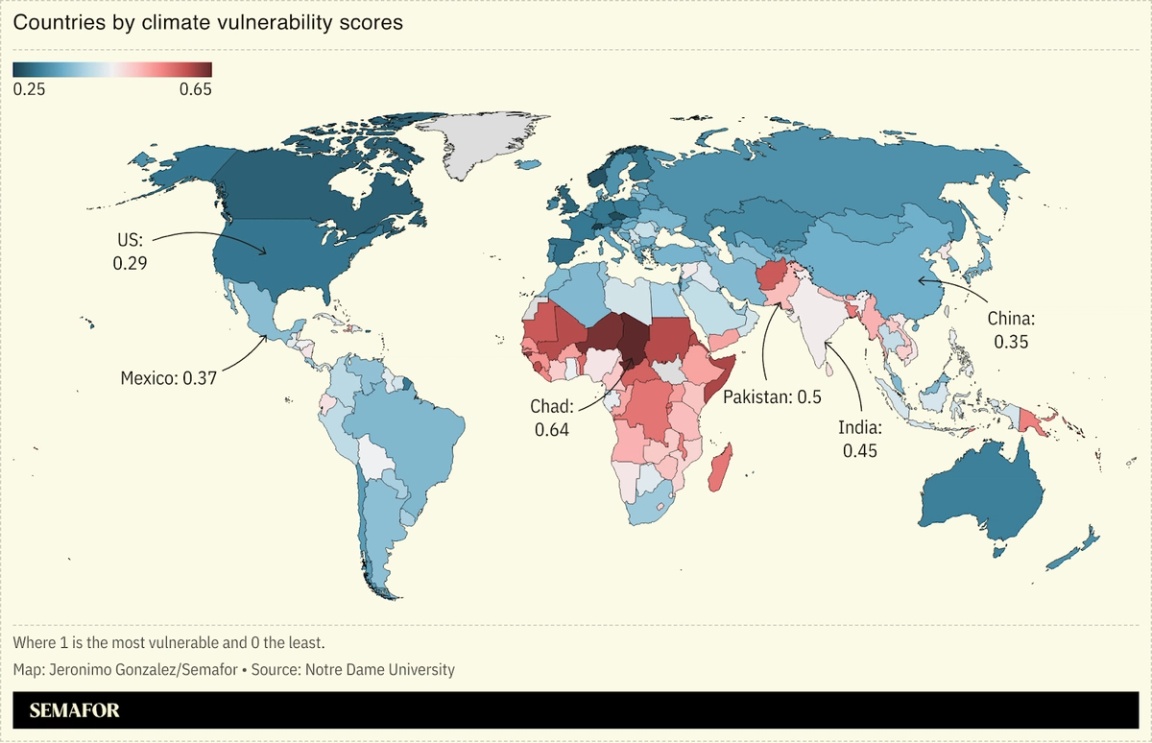 Almost 400 people have died in Pakistan after flash floods brought destruction throughout the country’s north. The heavier than usual monsoon season has also battered Mumbai, leaving swaths of the Indian megalopolis under water. Huge rainfall has wreaked havoc across much of the northern hemisphere this summer, including floods in central Texas that led to one of the state’s worst natural disasters, as well as record downpours in Mexico City. Experts fear that global warming — which leads to increased evaporation and thus more frequent and intense downpours — will make once-extraordinary climatic events more common. The Pakistan floods, in particular, highlight “why a rapid transition from fossil fuels… is so urgent,” an expert told the Associated Press. |
|
Droughts hit Middle East, Europe |
 Murad Sezer/Reuters Murad Sezer/ReutersSevere droughts hit countries extending from the Middle East through Europe. Iraq has seen water levels along its two main rivers, the Tigris and the Euphrates, fall by more than a quarter and is grappling with its driest year since 1933, while Reuters catalogued water shortages in Hungary, Serbia, Syria, and Turkey, harming livestock, forcing farmers to abandon their land, and driving officials to impose restrictions on the use of water. The economic consequences of the droughts — which are made more frequent and extreme by climate change — are huge: The cost of a drought today is twice what it was in 2000, and the OECD projects those costs will rise at least a further 35% by 2035. |
|
Wildfires hit Europe, North America |
 Nacho Doce/Reuters Nacho Doce/ReutersWildfires enveloped much of Europe and North America, forcing people from their homes and worsening air quality across borders. Spain and Portugal were the worst-affected countries in Europe, which has seen its most destructive wildfire season in nearly 20 years, covering about 3,500 square miles, or about 9,000 square kilometers. And thousands were evacuated as a result of Canada’s second-worst wildfire season ever, cementing what has become a new normal of sorts: The last three years have been among the 10 worst on record, CBC said, and for a third year running, major US cities including Boston, Detroit, and New York are experiencing dangerous levels of air pollution as a result. |
|
China’s brutal green sectors |
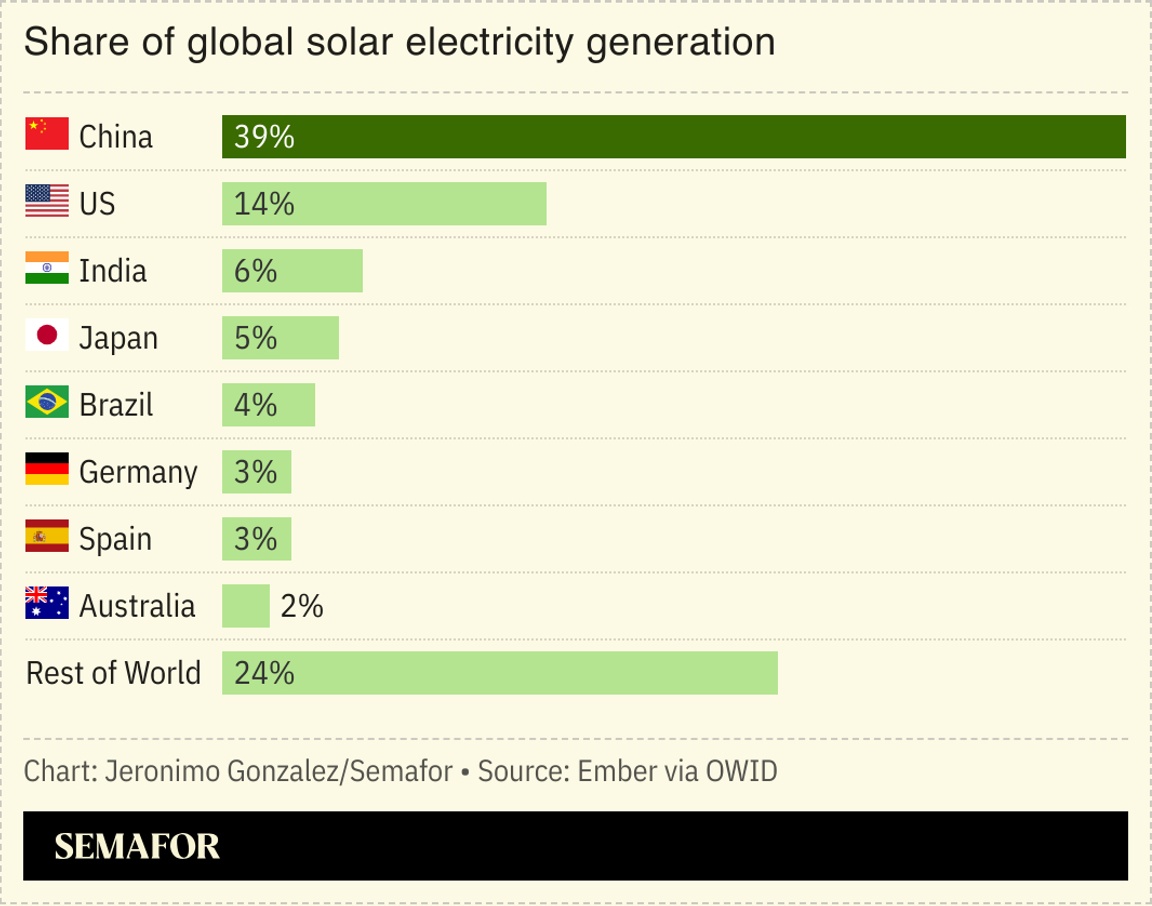 Brutal competition in China’s clean tech sector is forcing electric-vehicle companies abroad in search of growth while the solar industry readies a cartel to combat mammoth overcapacity. Chinese EV firms reported strong results this week — XPeng announced record sales while Xiaomi saw net profit more than double — but, faced with an increasingly saturated market and persistent price wars, Xiaomi is looking farther afield, announcing an expansion to Europe by 2027. The solar sector, meanwhile, plans to pool $7 billion in order to buy out and shutter the least efficient manufacturing sites, before forming a cartel: Panel prices have plummeted, many companies operate at a loss, and the industry shed a third of its total jobs last year alone. |
|
Mexico denies US drug partnership |
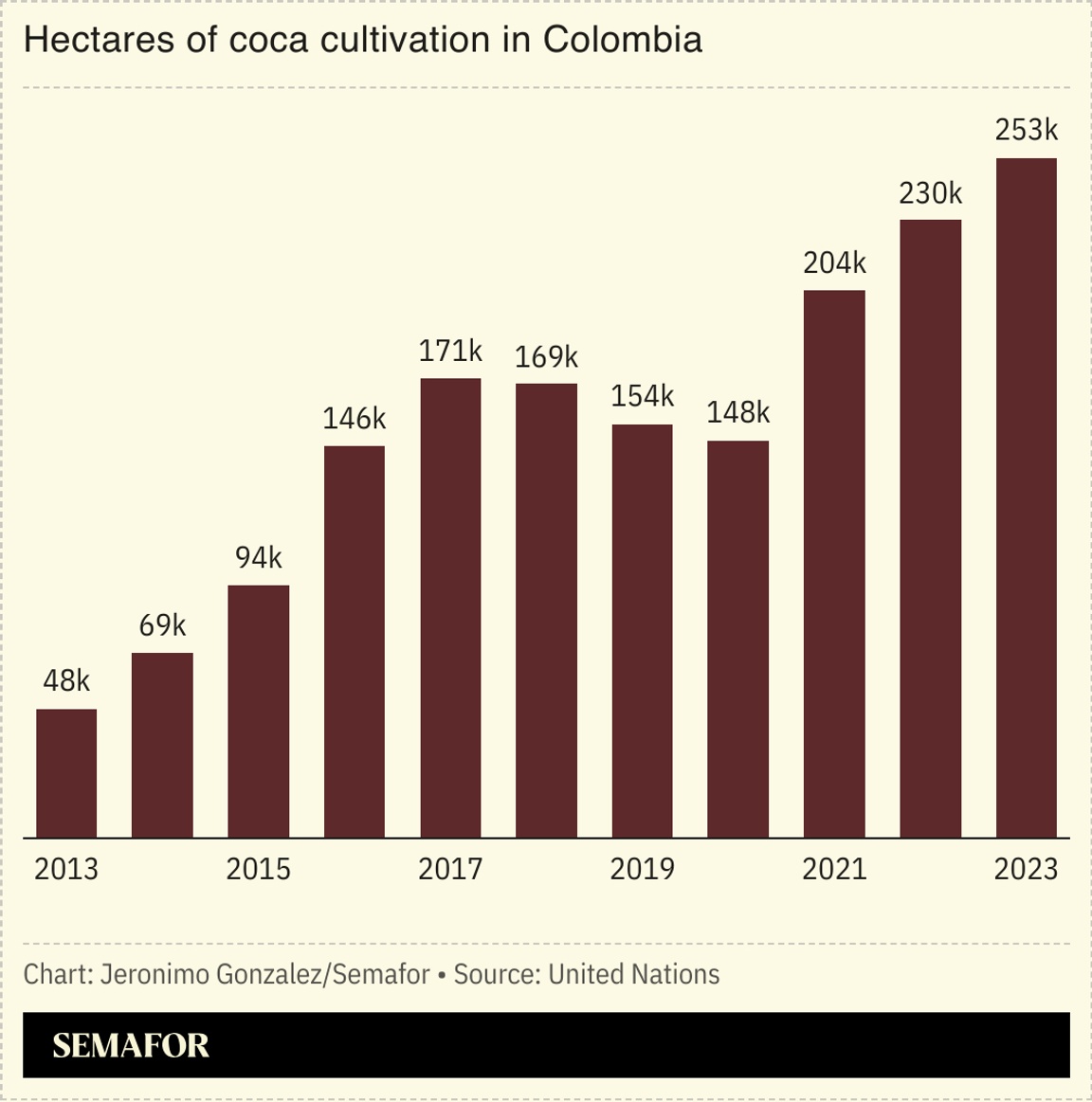 Mexican President Claudia Sheinbaum denied her country had agreed a partnership that had been announced by the US to fight cartels, heightening tensions between the neighbors. US President Donald Trump has threatened steep tariffs if Mexico fails to stop drug flows, and his Drug Enforcement Agency said this week it would collaborate with Mexican law enforcement to combat cartels — except Sheinbaum said her government had no idea what the DEA was referring to. Sheinbaum has veered from her predecessor’s laissez-faire approach to crime, yet cartels are still thriving, while unchecked cocaine production in Colombia has fueled their takings, allowing them to further bolster their fire power. “It’s really hard to be optimistic,” an expert told the Financial Times. |
|
US ramps up migrant crackdown |
 US Army Sgt. 1st Class Nicholas J. De La Pena/US Department of Defense via Getty Images US Army Sgt. 1st Class Nicholas J. De La Pena/US Department of Defense via Getty ImagesThe US reached a deal to deport migrants to Uganda and Honduras as Washington ramps up its crackdown on undocumented migration. Under the agreement, Uganda will receive African and Asian migrants who had claimed asylum in the US, while Honduras will receive deportees from Spanish-speaking countries, CBS reported. The White House has courted several African nations for similar deals despite protestations from human rights advocates who fear migrants being deported to countries with poor rights records: This month, Rwanda agreed to take in 250 deportees from the US, but critics say those sent to the East African nation could be deported again to more dangerous countries, the BBC reported. |
|
Stablecoins’ global growth |
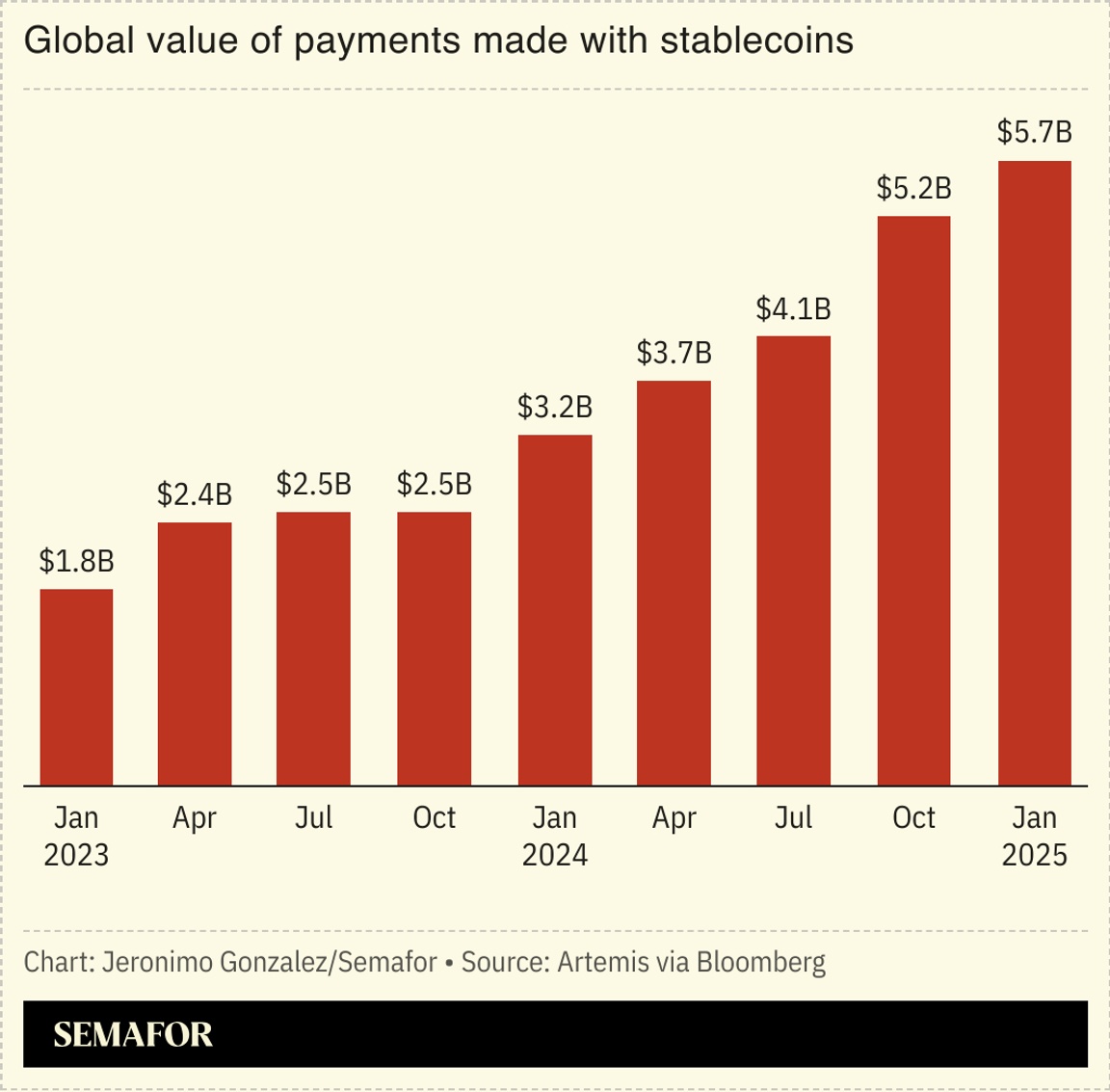 Japan this week approved the issuance of its first yen-denominated stablecoin, part of a wave of moves to expand the use of the digital currencies worldwide. A Tokyo-based remittance company plans this year to issue its first stablecoin, which differ from cryptocurrencies in that they are typically pegged on an equal basis to a fiat currency, usually the dollar. Because so many are tied to dollars, an expansion of stablecoins has financial as well as geopolitical implications: The US Treasury secretary has reportedly told Wall Street executives that he expects stablecoins to bolster demand for US government bonds, while China is increasingly worried about stablecoins’ use, a leading expert noted, because they more easily evade capital controls. |
|
|